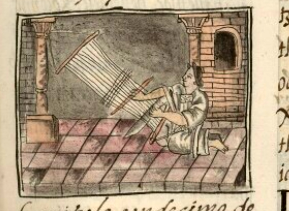iquitqui (FCbk10f24r)
This iconographic example, featuring a woman weaver (iquitqui, or ihquitqui with the glottal stop), is included in this digital collection for the purpose of making comparisons with related hieroglyphs. The term selected for this example comes from the previous page of text to the image, as found in the Digital Florentine Codex. There is no gloss, per se. This example shows a Nahua woman weaving with a backstrap loom. It is tied to a European-style column. She sits on a pink or red tile floor. So, the setting shows considerable Spanish-colonial influence. The woman’s personal effects and posture, however, are little changed from the autonomous era. Her hair is in the classic style for mature women, the neaxtlahualli or axtlacuilli. She is dressed in a hand-woven tunic (huipilli) with a quincunx design on the patch at the base of the V-neck. She also wears a skirt (cueitl) under the tunic. Her clothing has some folds that are marked by shading, giving it a three-dimensionality (typical of the European artistic influence revealed by this manuscript).
Stephanie Wood
While textiles are a regular feature across this collection, hieroglyphs of looms or women weaving are not. Spindles do occur with some frequency, however.
Stephanie Wood
Higuitgui
iquitqui (or ihquitqui, with the glottal stop)
Stephanie Wood
1577
Jeff Haskett-Wood
tejedoras, telar de cintura, tejer, mujer, mujeres, textiles
iquitqui, a weaver, https://nahuatl.wired-humanities.org/content/iquitqui
la tejedora
Stephanie Wood
Available at Digital Florentine Codex/Códice Florentino Digital, edited by Kim N. Richter and Alicia Maria Houtrouw, "Book 10: The People", fol. 24r, Getty Research Institute, 2023. https://florentinecodex.getty.edu/en/book/10/folio/24r/images/0 Accessed 5 September 2025.
Images of the digitized Florentine Codex are made available under the following Creative Commons license: CC BY-NC-ND (Attribution-NonCommercial-NoDerivs 4.0 International). For print-publication quality photos, please contact the Biblioteca Medicea Laurenziana ([email protected]). The Library of Congress has also published this manuscript, using the images of the World Digital Library copy. “The Library of Congress is unaware of any copyright or other restrictions in the World Digital Library Collection. Absent any such restrictions, these materials are free to use and reuse.”



